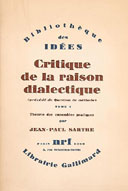Critique of Dialectical Reason

Cover of the first edition
|
|
| Author | Jean-Paul Sartre |
|---|---|
| Original title | Critique de la raison dialectique |
| Translator | Alan Sheridan-Smith |
| Country | France |
| Language | French |
| Subject | Marxism |
| Publisher | Éditions Gallimard |
|
Publication date
|
1960 (vol. 1) 1985 (vol. 2) |
|
Published in English
|
1976 (vol. 1) 1991 (vol. 2) |
| Media type | Print (Hardcover and Paperback) |
| Pages | 835 (English ed., vol. 1) 467 (English ed., vol. 2) |
| ISBN | (vol. 1) 0-86091-311-2 (vol. 2) |
Critique of Dialectical Reason (French: Critique de la raison dialectique) is a 1960 book by the philosopher Jean-Paul Sartre, in which the author further develops the existentialist Marxism he first expounded in his essay Search for a Method (1957).Critique of Dialectical Reason and Search for a Method were written as a common manuscript, with Sartre intending the former to logically precede the latter. Sartre's second large-scale philosophical treatise, Being and Nothingness (1943) having been the first,Critique of Dialectical Reason has been seen by some as an abandonment of Sartre's original existentialism, while others have seen it as a continuation and elaboration of his earlier work. It was translated into English by Alan Sheridan-Smith.
The first volume, "Theory of Practical Ensembles", was first published in English in 1976; a corrected English translation was published in 1991, based on the revised French edition of 1985. The second volume, "The Intelligibility of History", was published posthumously in French in 1985 with an English translation by Quintin Hoare appearing in 1991.
Sartre is quoted as having said this was the principal of his two philosophical works for which he wished to be remembered.
In the wake of Being and Nothingness, Sartre became concerned to reconcile his concept of freedom with concrete social subjects and was strongly influenced in this regard by his friend and associate Maurice Merleau-Ponty, whose writings in the late 1940s and early 1950s (such as Sense and Non-Sense) were pioneering a path towards a synthesis of existentialism and Marxism. Merleau-Ponty, however, then became increasingly skeptical of Marxism, culminating in his Adventures of the Dialectic (1955), while Sartre continued to grow more engaged with Marxist thought. Though Sartre had, by 1957, decisively broken with the Soviet Union and "official" Marxism in the wake of the Soviet suppression of the Hungarian uprising, he nonetheless declared Marxism "the philosophy of our time" and stated the need to resuscitate it from the moribund state that Soviet dogma had left it in, a need he attempted to answer by writing Critique of Dialectical Reason. The conflict between Sartre and Merleau-Ponty on this issue ended their long-standing friendship, though Ronald Aronson states that, in part, Critique of Dialectical Reason was Sartre's answer to his former friend and political mentor's attack on Marxism.
...
Wikipedia
